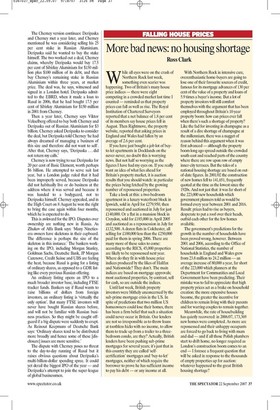More bad news: no housing shortage
Ross Clark Ivhile all eyes were on the crash of Northern Rock last week, something even scarier was happening. Two of Britain's many house price indices — there were eight competing in a crowded market last time I counted — reminded us that property prices can fall as well as rise. The Royal Institution of Chartered Surveyors reported that a net balance of 1.8 per cent of its members say house prices fell in August. Then Rightmove, the property website, reported that asking prices in England and Wales had fallen by an average of 2.6 per cent.
If you have just bought a job lot of buyto-let apartments in Docklands on the never-never, no doubt this is worrying news. But not half so worrying as the figures I have had my eyes on. If you really want an idea of what lies ahead for Britain's property market, it is auction results that you should watch: in particular the prices being fetched by the growing number of repossessed properties.
Take a look at this: a two-bedroom apartment in a luxury waterfront block in Ipswich, sold in April for £279,950, then repossessed and auctioned in July for just £140,000. Or a flat in a mansion block in Croydon, sold for £185,000 in April 2005 and auctioned as a repossession in July for £132,500. A dozen flats in Colchester, all selling for £100,000 less than the £250,000 paid for them in spring 2006. There are many more of these sales to come: according to the RICS, 45,000 properties are likely to be repossessed next year. Where do they fit in with house price indices produced by the likes of Halifax and Nationwide? They don't. The main indices are based on mortgage approvals; most auctioned properties, by contrast, sell for cash, so are outside the indices.
Until last week, British property investors were blithely unconcerned by the sub-prime mortgage crisis in the US. In spite of predictions that two million US homeowners could lose their homes, there has been a firm belief that such a situation could never occur in Britain. Our lenders are not so irresponsible as to throw loans at toothless hicks with no income, to allow them to trade up from a trailer to a threebedroom condo, are they? Actually, British lenders have been pushing sub-prime mortgages for several years; it's just that in this country they are called 'selfcertification' mortgages and 'buy-to-let' mortgages, neither of which require the borrower to prove he has sufficient income to pay his debt — or any income at all.
With Northern Rock in intensive care, overenthusiastic home-buyers are going to lose one of their favourite sources of credit, famous for its mortgage advances of 130 per cent of the value of a property and loans of 5.9 times a buyer's income. But a lot of property investors will still comfort themselves with the argument that has been employed throughout Britain's 10-year property boom: how can prices ever fall when there's such a shortage of property? Like the fad for investing in champagne as a result of a dire shortage of champagne at the millennium, there was a nugget of reason behind this argument when it was first advanced — although the property boom long ago spread outside the crowded south-east and reached parts of the country where there are row upon row of empty inner-city terraces. But the tales of a national housing shortage are based on outof-date figures. In 2001/02 the construction of new homes fell to 141,651, frequently quoted at the time as the lowest since the 1920s. And not just that: it was far short of the 223,000 new households which government planners told us would be formed every year between 2001 and 2016. Result: prices had to rise as buyers, desperate to put a roof over their heads, outbid each other for the few homes available.
The government's predictions for the growth in the number of households have been proved wrong, however. Between 2001 and 2006, according to the Office of National Statistics, the number of households in England and Wales grew from 23.8 million to 242 million — an average increase of 80,000 a year, far short of the 223,000 which planners at the Department for Communities and Local Government have been predicting. Their mistake was to fail to appreciate that high property prices act as a brake on household creation: the more expensive houses become, the greater the incentive for children to remain living with their parents and for warring couples to remain together.
Meanwhile, the rate of housebuilding has quietly recovered: in 2006/07, 173,369 new homes were completed. As more are repossessed and their unhappy occupants are forced to go back to living with mum and dad — and if all those Polish plumbers start to drift home, no longer required as London's construction boom comes to an end — I foresee a frequent question that will be asked in response to the thousands of empty properties up for auction: whatever happened to the great British housing shortage?

































































 Previous page
Previous page